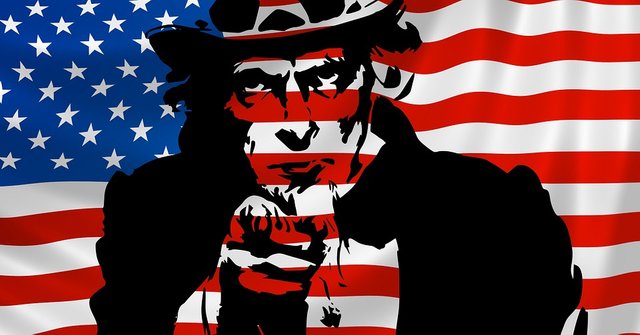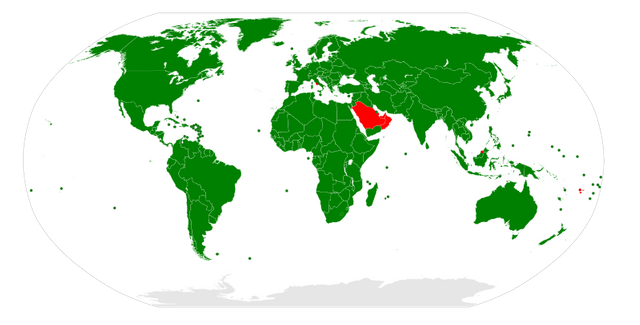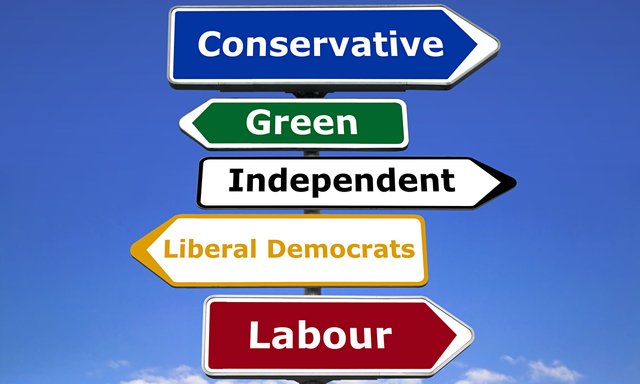Do we really live in democracy today?

We live in a democratic world, where the people are the sovereign and are direct or indirect participants of all decisions made by the government of their country, where people take a leadership role and are decisive in choosing a path towards the future, and where each and every one of us has a preponderant role in national politics… or at least that is what the rulers want us to believe.
No matter in which country of the world you live, whether you are governed by a president, a king or a dictator, the most likely thing is that the State that commands over your head calls itself democratic, in fact, the facade of democracy is so important for international politics, that only 6 States in the world don't call themselves democratic (Brunei, Fiji, Oman, Saudi Arabia, United Arab Emirates, and Vatican City).

There is representative democracy, direct democracy, semi-direct democracy, liberal democracy, people's democracy, and other democracies with adjectives that sound good and inspire positive emotions in the heads of people.
Western governments, self-proclaimed liberal democracies, and don't recognize China's democracy, the latter for its part, is entitled as enlightened democracy, and blames the western democracies for decadent. George Orwell once said that "the defenders of every kind of regime claim that it is a democracy", and this applies to China... as well as to the West.
Before dictating whether or not it is, or if democracy exists in theory or practice in some country, first let's take a look at the main types of democracy that exist, and I say main, because anyone can devise in their head, either by study or epiphany, a new form of social organization and entitle it to democracy, as is common in modern politics, and to place next to it an adjective or two that are associated with positive ideas and emotions, something like "protagonistic revolutionary democracy".
Democracy

Democracy is a form of social organization that attributes the ownership of power to the whole of citizenship, although in its beginnings in Ancient Greece and in the first modern democracies, women, slaves and in some cases even people of different ethnicity or religion were not included as citizens. Nowadays, a democratic system without universal suffrage is impossible and unthinkable.
In the West, democracy has degenerated into its representative version, and in which it loses the essential value of its existence and goal, which is to give power to the population, instead, in representative democracy the people elect people to the which delegate his power as sovereigns. Currently, there are two countries with a version of representative democracy in which it is tried to rescue a little more the original goal of the system, these are the semi-direct democracies in force in Switzerland and Liechtenstein, in which the population has the option to participate directly in governance through different forms of popular action, such as binding referendums, popular legislation initiatives, the possibility of a mandate revocation to elected offices, plebiscites and some other public consultations.
On the other hand, in some countries of Africa, Asia, Latin America, and during the 20th century, Eastern Europe, the so-called "people's democracy" have been carried out, especially in countries with a Marxist tendency, which, unlike the "liberal western democracies", the facade of pluralism is replaced by an open elitism, where the role of the elite is occupied by the leadership of the only existing party in the nation; the Communist Party. These one-party "democracies" don't differ much from the existing system of government in the former Nazi Germany, where elections were also held, but the course of the country and its direction fell only to a small clique of people in the high stratum of the ruling party, in fact, in the only thing that exists a considerable difference between the imperial Nazi regime and the so-called people's democracies, is that the first don't consider themselves democrats, and the latter do.
However, despite all of these approaches we have seen above, in practice democracies have degenerated even more with the inclusion of political parties, which are present in absolutely all modern democracies, accompanied also by the aberrant class of politicians, and this is where the system is completely distorted, because although at first it was assumed that democracy completely eliminated the system of elites and social division, the existence of this class of people supposedly dedicated to politics, but in practice is a quasi-aristocratic and plutocratic elite, completely damaging the essential idea of people's government.
Political Parties

Political parties are the cancer of modern democracy, and the sentence from its inception to failure. The creation of a political class first violates the essence of democracy, because when a class exists that has supremacy in the executive power over the others, whether de jure or de facto, an oligarchy is created, that is, a government of few, which is by nature incompatible with democracy, which is the government of many.
Political parties divide the population into factions, creating a "block democracy", in which citizens don't seek their common good during elections, but the good of their group, in addition to dividing the nation and confronting the population. Political parties also make it possible for democracy to become ochlocracy, subsequently giving way to the tyranny of the majority. In addition, when pursuing not the individual welfare and not the national, but the group, unpopular options can be applied because they are popular only in a small group of society:
If there are three main factions during a presidential election, and the dominant one between these factions has around 40%, the other 60% being divided in equal parts between the other two groups, it is likely that a minority group prevails, that is, only 40% of the population supports the winning candidate, and if in addition to this, in the internal elections that winning candidate obtained only 60% of the support of his party, the total of people who support that person in a committed way to exercise that position is only 24% of the voting population, and you should bear in mind that not all people vote, in fact, in almost all countries most people don't do it. In this way, a candidate is legitimately elected in a democratic regime, but not under the essential principles of democracy.
The political parties also violate the republican principles established by Montesquieu, as the division of powers, since there is a group that can act as a whole, the same body can have control over the different powers in a hegemonic way, turning organisms that should have a predominantly deliberative purpose like the assembly, the congress or the senate, in purely legislative objects, where nothing is debated nor is it possible to reach an agreement between the deputies of different parties, since their goals, far from being the benefit of the nation, is the strengthening of the party and its ideology, as these adverse deputies don't seek the same goal (since they have different ideologies), they cannot agree.
It is curious that although the political parties are by nature anti-democratic and anti-republican, in the United States the two main parties are the Democratic Party and the Republican Party.
With this in mind, we can be quite sure that there is no such thing as democracy in any modern society, not even that recognized as "representative democracy" is truly a democracy, since as Rousseau said, sovereignty cannot be represented.
Sovereignty, for the same reason as makes it in alienable, cannot be represented; it lies essentially in the general will, and will does not admit of representation: it is either the same, or other; there is no intermediate possibility. The deputies of the people, therefore, are not and cannot be its representatives: they are merely its stewards, and can carry through no definitive acts. Every law the people has not ratified in person is null and void -- is in fact, not a law. The people of England regard itself as free; but it is grossly mistaken; it is free only during the election of members of parliament. As soon as they are elected, slavery overtakes it, and it is nothing. The use it makes of the short moments of liberty enjoys shows indeed that it deserves to lose them.
Source: Rousseau, Jean-Jacques. (1762). The Social Contract.
Direct democracy is the only true democracy, because it is the only one that truly gives power to the people, to the vast majority of citizens. This does not mean that there are currently no approximations or models that are more or less democratic than others, but in short, only direct democracy fulfills its essential goal and has the right to be called as such.
At present, direct democracy ceased to be a utopia or a system of small countries, but technology allows us to finally implement a digital system of democracy in which the people don't need the representation of a class of politicians to govern themselves, but on the contrary the people can vote, choose, propose and go towards the destination to which it wishes to do it. Both the Internet computer revolution and the current development of Blockchain technology make this possibility more than feasible. The assembly has to return to its deliberative role only as in the beginning of Rome, political parties must be eliminated, and large states must be reduced and federalized in favor of greater citizen power, now it may seem that we are very far from that, but the reality is that when a society wants to take the step towards a true democracy, then nothing can prevent it.

no..we do NOT live in a democracy.
haven't since the clans.
see my post on monkeysphere, dunbar's number, behavioral sinks and the Iron Law.
That is the summary... we do NOT do it
nope...not even possible at our present level of technology.
I don't believe that technology is the problem and neither is the solution, with a more primitive technology, better results have been achieved. Athens had a population similar to that of the current Iceland and with technology 2000 years behind and had better results.
The problem is that the rulers are clinging to power and people are very indifferent to that, in this case, technology can help a lot, but people have to take the step.
athens population was mixed...most of whom were slaves.
of the non slave population...how many were there?
i'd guess NOT many..
NOT far outside (if at all) the phase change envelope of the monkeysphere.
the laws change inside vs outside.
the further away from the phase change envelope..the MORE the laws change.
it's crazy isn't it?
To the question in your title, my Magic 8-Ball says:
Hi! I'm a bot, and this answer was posted automatically. Check this post out for more information.
Congratulations! Your post has been selected as a daily Steemit truffle! It is listed on rank 7 of all contributions awarded today. You can find the TOP DAILY TRUFFLE PICKS HERE.
I upvoted your contribution because to my mind your post is at least 30 SBD worth and should receive 55 votes. It's now up to the lovely Steemit community to make this come true.
I am
TrufflePig, an Artificial Intelligence Bot that helps minnows and content curators using Machine Learning. If you are curious how I select content, you can find an explanation here!Have a nice day and sincerely yours,

TrufflePig